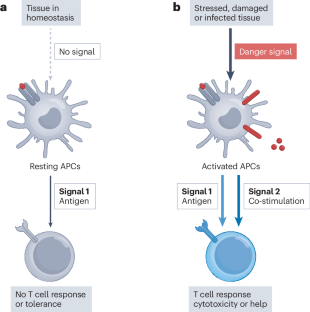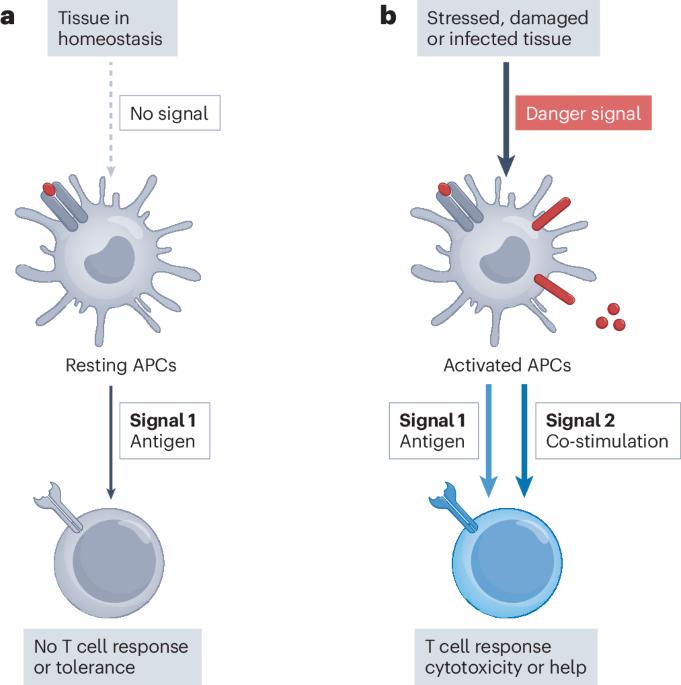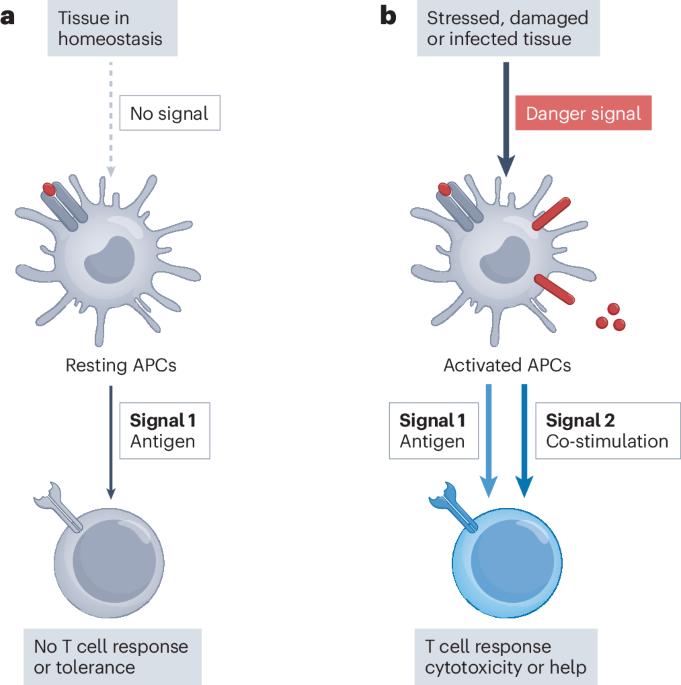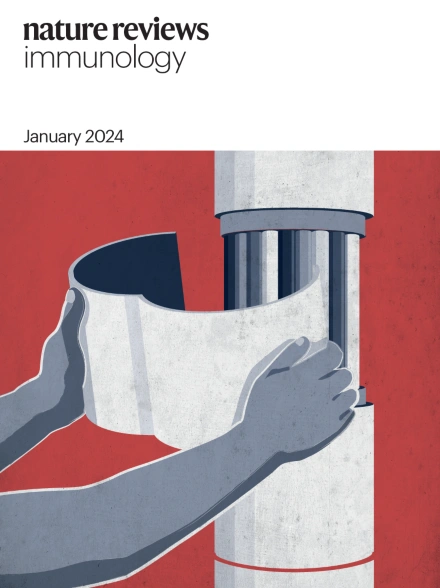The danger theory of immunity revisited
IF 60.9
1区 医学
Q1 IMMUNOLOGY
引用次数: 0
Abstract
The danger theory of immunity, introduced by Polly Matzinger in 1994, posits that tissue stress, damage or infection has a decisive role in determining immune responses. Since then, a growing body of evidence has supported the idea that the capacity to elicit cognate immune responses (immunogenicity) relies on the combination of antigenicity (the ability to be recognized by T cell receptors or antibodies) and adjuvanticity (additional signals arising owing to tissue damage). Here, we discuss the molecular foundations of the danger theory while focusing on immunologically relevant damage-associated molecular patterns, microorganism-associated molecular patterns, and neuroendocrine stress-associated immunomodulatory molecules, as well as on their receptors. We critically evaluate patient-relevant evidence, examining how cancer cells and pathogenic viruses suppress damage-associated molecular patterns to evade immune recognition, how intestinal dysbiosis can reduce immunostimulatory microorganism-associated molecular patterns and compromise immune responses, and which hereditary immune defects support the validity of the danger theory. Furthermore, we incorporate the danger hypothesis into a close-to-fail-safe hierarchy of immunological tolerance mechanisms that also involve the clonal deletion and inactivation of immune cells. Thirty years ago, Polly Matzinger introduced the ‘danger theory of immunity’, which proposed that danger and damage have a decisive role in immune responses. In this Perspective, Kroemer et al. reflect on the impact of the danger theory, discuss its molecular foundations and present an extended version of it. They propose that immunological self-tolerance is organized in a hierarchy that functions in a close-to-fail-safe cascade-like fashion, thereby reconciling Matzinger’s danger theory with the self–non-self-discrimination hypothesis.



重温免疫的危险理论
波莉-马津格(Polly Matzinger)于 1994 年提出的免疫危险理论认为,组织应激、损伤或感染在决定免疫反应方面起着决定性作用。从那时起,越来越多的证据支持这一观点,即引起同种免疫反应的能力(免疫原性)依赖于抗原性(被 T 细胞受体或抗体识别的能力)和佐剂性(由于组织损伤而产生的额外信号)的结合。在此,我们将讨论危险理论的分子基础,同时重点关注与免疫相关的损伤相关分子模式、微生物相关分子模式、神经内分泌应激相关免疫调节分子及其受体。我们严格评估与患者相关的证据,研究癌细胞和致病病毒如何抑制损伤相关分子模式以逃避免疫识别,肠道菌群失调如何减少免疫刺激微生物相关分子模式并损害免疫反应,以及哪些遗传性免疫缺陷支持危险理论的有效性。此外,我们还将危险假说纳入了免疫耐受机制的近乎安全的层次结构中,其中也涉及免疫细胞的克隆性删除和失活。
本文章由计算机程序翻译,如有差异,请以英文原文为准。
求助全文
约1分钟内获得全文
求助全文
来源期刊

Nature Reviews Immunology
医学-免疫学
CiteScore
93.40
自引率
0.40%
发文量
131
审稿时长
6-12 weeks
期刊介绍:
Nature Reviews Immunology is a journal that provides comprehensive coverage of all areas of immunology, including fundamental mechanisms and applied aspects. It has two international standard serial numbers (ISSN): 1474-1733 for print and 1474-1741 for online. In addition to review articles, the journal also features recent developments and new primary papers in the field, as well as reflections on influential people, papers, and events in the development of immunology. The subjects covered by Nature Reviews Immunology include allergy and asthma, autoimmunity, antigen processing and presentation, apoptosis and cell death, chemokines and chemokine receptors, cytokines and cytokine receptors, development and function of cells of the immune system, haematopoiesis, infection and immunity, immunotherapy, innate immunity, mucosal immunology and the microbiota, regulation of the immune response, signalling in the immune system, transplantation, tumour immunology and immunotherapy, and vaccine development.
 求助内容:
求助内容: 应助结果提醒方式:
应助结果提醒方式:


